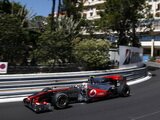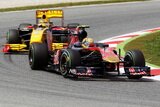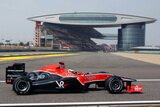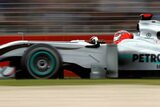So during Wednesday's Vodafone McLaren Mercedes 'Phone-In' session Tim Goss, the chief engineer of McLaren's current challenger, the MP4-25, had a lot more to discuss than simply this weekend's Spanish Grand Prix, principally the possible introduction of KERS-assisted turbo engines in 2013, when the FIA's stringent engine rules can be modified significantly for the first time since 2006.
Over the last four seasons, the regulations have required the use of 2.4 litre V8 engines, which now rev to a limit of 18,000 RPM. Plans, however, are afoot to potentially reintroduce turbo engines in place of the normally-aspirated units that have been in use since 1989. Goss, for one, is excited about the prospect.
“As far as the 2013 engine is concerned, I think that Formula One does need to move on and show that it is moving in a fuel-efficiency age,” he explained. “So we fully support all the moves that the Engines Working Group and FOTA are doing to push Formula One in that direction. The concept of a 2.4 litre V8 is getting a little bit dated now and I think the move to turbo-charged engines with KERS is the right thing to do.
“Obviously Formula One does need to maintain itself in terms of being at the pinnacle of motorsport and engine performance. Somehow we've got to come up with an engine formula that is associated with high performance but also with fuel efficiency and modern technology. So overall I think we're moving in the right direction and we fully support it.”
There have also been strong suggestions that KERS (Kinetic Energy Recovery Systems) could return to Formula One racing at the same time - if not before. KERS was introduced as an option at the start of 2009, but while several teams flirted with the technology, only McLaren and Ferrari used it regularly, and it was dropped by all teams for 2010.
However, there is growing support among the teams for the reintroducing the concept, and there are hopes a more cost effective, powerful and efficient system could be developed.
“We learnt an awful lot when we developed the KERS system for 2009 and Mercedes and ourselves did a particularly good job of it,” explained Goss. “But in the current environment of cost restrictions then the right thing to do is to cap the cost of KERS in some way, or it could potentially escalate and get very expensive.
“It certainly is realistic to reduce the cost and put the power up. A knock-on effect of that is that it's going to get a little bit bigger and heavier. A lot of the improvement we made to our KERS system last year was the ability to downsize the system, which then makes it easier to package on the car and gives you freedom to get the weight distribution correct. It's possible, that's for sure.”
Although KERS would most likely be readopted at the same time as the revised engines in 2013, there has also been talk of it coming back as soon as 2011. But whilst Goss is in favour of the return of the hybrid technology, he believes a decision would need to be made quickly if it were to be viable for next season.
“Certainly for using it for next season, it is getting a bit late in the day,” Goss concluded. “We understand the need for KERS in terms of its association
with road car technology, and that it's the right thing to bring it back. So really we'll just go along with whatever FOTA and the FIA decide, as far as next year is concerned.”
formula1.com
Comments:








